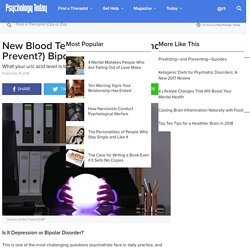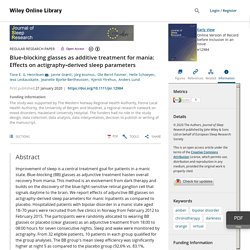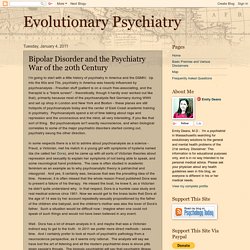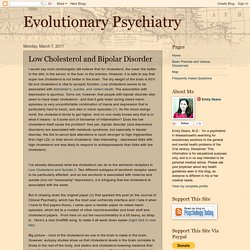

Mood Disorders, Depression and Anxiety, and the Gut Microbiome. Bipolar 2: Mood Swings but Not Manic - PsychEducation.org. Is Bipolar Disorder Caused by Chronic Inflammation? Natural Approach to Managing Manic Depression. Do you or someone you know experience extreme mood swings with any type of recurring frequency?

I’m talking about things like manic “high” period of increased energy in rotation with very “low” periods of depression. If so, it may a sign of manic depression. Although many people live with manic depression, also known as bipolar disorder, many are never accurately diagnosed. Experts believe at least 5 million to 6 million people suffer from this condition in the U.S. alone. Dark Therapy - PsychEducation. (updated 2/2019) Dark Therapy will take a little explaining.

First, understand how powerful darkness is, as a treatment tool. At the end, discover that you can have your darkness and eat it too! A single case began Dark Therapy Here’s a story from the great research team at the National Institutes of Mental Health (NIMH), originally reported in Bipolar Network News from which the graphic below derives; later published by Wehr and colleagues. Here you see a 3 year record of sleep and mood for a man with rapid-cycling bipolar disorder. Next to it, marked by purple , is the total amount of sleep per 24 hours (to the right is a lot, to the left is a little — again, it’s the pattern that matters).
On the right, marked by blue , you see a mood record that shows obvious and frequent cycling from manic peaks to depressive lows (the lows are slightly longer, you can see, especially the one marked ***). The main point so far is to see the rapid and obvious cycling. New Blood Test Helps Predict (and Prevent?) Bipolar Disorder. Source: Andriy Popov/123RF article continues after advertisement Is It Depression or Bipolar Disorder?

This is one of the most challenging questions psychiatrists face in daily practice, and getting the answer wrong can have serious consequences. Both major depressive disorder and bipolar disorder can involve bouts of severe depression that interfere with one’s ability to function, but manic episodes only occur in bipolar disorder. While most people think of manic episodes as periods of extreme excitement, euphoria and hyperactivity, mania can take other forms, such as irritability, rage, intense anxiety, prolonged panic, or extreme obsessive-compulsive symptoms. It can be surprisingly difficult sometimes even for experienced clinicians to tell the difference between major depression and bipolar disorder because most people seek care during a depressive episode, and depression symptoms can look similar in both cases. The Uric Acid Test. Blue‐blocking glasses as additive treatment for mania: Effects on actigraphy‐derived sleep parameters - Henriksen - - Journal of Sleep Research.
Bipolar disorders (BDs) have traditionally been regarded as disorders of mood.

Several coinciding symptoms, however, cycle in remarkable synchrony with the mood swings, in particular alterations in sleep and activity (Scott et al., 2017; Wehr et al., 1998). Sleep disturbances are common in all states of BD, but usually exacerbated during episodes (Bauer et al., 2006; Gruber et al., 2011). The most dramatic changes in sleep patterns and subjective need for sleep occur during mania.
Resolution of Refractory Bipolar Disorder Through Lifestyle Interventions: A Case Report. Advanced Nutrient Therapies for Bipolar Disorder. Biochemistry Features Of Bipolar Disorders And Advanced Nutrient Therapies. This webinar will summarize laboratory studies of 1,600 bipolar patients and describe nutrient therapy approaches aimed at normalizing brain chemistry.

The presentation will discuss treatments for methylation imbalances, pyrrole disorders, metal-metabolism abnormalities, oxidative overload, and toxic metals. The epigenetic impacts of specific nutrients on neurotransmission will be presented along with the role of mitochondrial and glial processes in this challenging disorder. Tell us what you think! After you've watched Dr. Walsh's presentation, please take our follow-up survey here. Behind The Mask: Carnevale di Venezia - Annual Fundraising Gala. Natural Healing for Bipolar Disorder. Fast-Forward: Insulin Resistance Speeds Cycling in Bipolar Patients. Evolutionary Psychiatry: Bipolar Disorder and the Psychiatry War of the 20th Century.
I'm going to start with a little history of psychiatry in America and the DSMIV.

Up into the 60s and 70s, psychiatry in America was heavily influenced by psychoanalysis - Freudian stuff (patient is on a couch free-associating, and the therapist is a "blank screen" - theoretically, though it hardly ever worked out like that), primarily because most of the psychoanalysts fled Germany during WWII and set up shop in London and New York and Boston - these places are still hotspots of psychoanalysis today and the center of East Coast academic training in psychiatry. Psychoanalysts spend a lot of time talking about rage and repression and the unconscious and the mind, all very interesting, if you like that sort of thing.
But psychoanalysis isn't exactly neuroscience, and when biological correlates to some of the major psychiatric disorders started coming out, psychiatry swung the other direction. Well. Evolutionary Psychiatry: Low Cholesterol and Bipolar Disorder. I would say most cardiologists still believe that for cholesterol, the lower the better.

In the diet, in the serum, in the liver, in the arteries. However, it is safe to say that super low cholesterol is not better in the brain. Nutrient-based therapies for bipolar disorder: a systematic review. - PubMed - NCBI. Evolutionary Psychiatry: Alternative Therapies and Bipolar Disorder. I will get back to OCD.

In the mean time a new paper came out called Nutrient-Based Therapies for Bipolar Disorder, A Systemic Review. And this paper is not written by some press agent working out of the basement of a supplement company. It's the Massachusetts General Hospital bipolar research clinic. I've been in meetings with some of these folks and heard them speak. Evolutionary Psychiatry: Ketogenic Diets and Bipolar Disorder: New Case Studies. Researching the viability of ketogenic diets for therapeutic usage was one of the original interests that launched this blog.

And while there is growing data for brain cancers and even a Cochran review for the use of ketogenic diets in epilepsy, the bipolar story has always been theoretical. Churchill: Change (song starts at about 30 secs) Ketogenic (very low carbohydrate and low protein) diets should work a bit like the mood stabilizer depakote in regulating unstable moods in bipolar disorder, making them an interesting option, should the research pan out. I explore the research and details in this post: A Dietary Treatment for Bipolar Disorder?
But the other day PubMed emailed me a new paper with links to the following article: The ketogenic diet for type II bipolar disorder. One woman described her irritability going away and a sense of calm. Neither woman had any adverse consequences and they remained stable on the diet for 2-3 years at the time the paper was published. Evolutionary Psychiatry: Obesity, Systemic Inflammation, and Bipolar Disorder. Mental illness is not invented, and psychiatry is not all in your head.

Today an exploration of the link between bipolar disorder and obesity. And there is a link, despite the tremendous confounding fact that most of the medicines used to treat bipolar disorder definitely cause obesity, researchers separate out the medication component (and also look at reports from history, prior to medications even being available) to find a strong correlation. Evolutionary Psychiatry: Evolutionary Psychiatry and Bipolar Disorder. A couple of papers came to my attention this week that relate to what I consider "real" evolutionary psychiatry.
That is, what are some evolutionary reasons we might have genes that make us vulnerable to psychiatric disorders. The "real" evolutionary psychology academics consider this discussion to be "Abnormal Psychology," and like all evolutionary psychology, it is somewhat controversial. I actually don't think about the disorders much as evolving in an evolutionary light… I tend to think in terms of the human body and gut and neurons working outside design specs, thus breaking down (that is "my" version of evolutionary psychiatry).
But the overlap between one ev psych and another deserves some scrutiny, because certainly I can make the case (and often do, to patients, particularly those with bipolar and ADHD and OCD) that there are elements of these disorders that are quite adaptive to certain situations, as long as the maladaptive parts don't derail everything. Well. Ms. Hmmm.